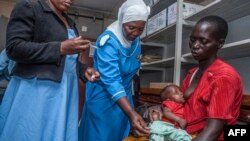A three-year study by 13 leading malaria and public health experts finds malaria eradication is feasible, but it will take new tools, political commitment, and lots of money to achieve.
The concept of malaria eradication is not new. It has been around since the mid-1950s, when the World Health Organization launched its first global malaria eradication plan.
Though that and subsequent efforts have failed to rid the world of the debilitating, often deadly, disease, experts say malaria eradication is feasible. They say there is no biological barrier to its elimination.
The director of the WHO’s Global Malaria Program, Pedro Alonso, says achieving that goal would involve improving primary health care and access to services, and better use of data and surveillance systems.
But the key to eradicating malaria, he says, is accelerated research and development of new tools.
“We need re-energized research and development efforts to develop the knowledge base, the strategies and the tools — be these vector control tools, drugs, improved vaccines or other technologies that will allow us to walk the last mile or even accelerate our road to eradication,” Alonso said.
Global malaria infection and death rates have remained virtually unchanged since 2015. The WHO reports every year some 200 million people are infected with malaria and about 400,000 of them die. It says more than 90 percent of those deaths occur in sub-Saharan Africa. Children form the biggest group of victims.
Health experts say eradicating malaria would both save lives and boost economies. But that takes political commitment and money. The WHO estimates the cost of scaling up current malaria intervention until 2030 at $34 billion.
The agency says the return on that investment would be huge. It says the strategy the money buys would save 4 million lives over the next 11 years, and would prevent 2 billion people from being infected with malaria. The economic gain, it says, would be roughly $283 billion in total gross domestic product.




